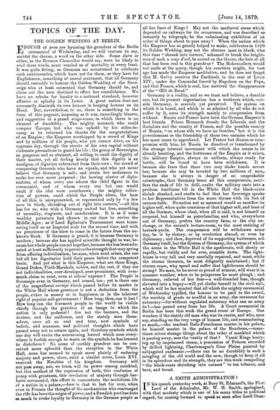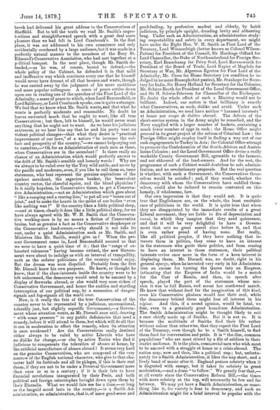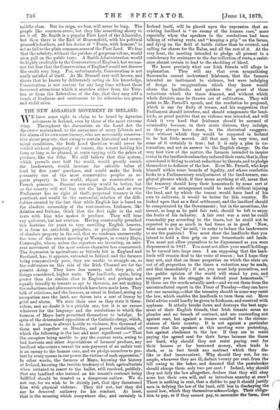A SMITH ADMINISTRATION?
IN his speech yesterday week, at Bury St. Edmund's, the Eh st Lord of the Admiralty, Mr. W. H. Smith, apologised, with that modesty which is one of his many titles to political regard, for coming forward to speak so soon after Lord Oran- brook had delivered his great address to the Conservatives of Sheffield. But to tell the truth we read Mr. Smith's unpre- tentious and straightforward speech with a great deal more pleasure than we had felt in Lord Cranbrook's. In the first place, it was not addressed to his own conscience and only accidentally overheard by a large audience, but it was made in a perfectly natural manner to the members of the Bury St. Edmund's Conservative Association, who had met together at a political banquet. In the next place, though Mr. Smith de- fended,—as he was, of course, bound to defend,—the whole policy of the Cabinet, he defended it in that mild and inoffensive way which convinces every one that he himself would never have dreamt of all that bounce and waste, though he was carried away by the judgment of his more ambitious and more popular colleagues. A sense of peace settles down upon one in reading one of the speeches of the First Lord of the Admiralty, a sense of peace to which, when Lord Beaconsfield, or Lord Salisbury, or Lord Cranbrook speaks, one is quite a stranger. We feel that we know what Mr. Smith wants, and that what he wants is perfectly moderate and reasonable. No doubt he leaves unwanted much that he ought to want, like all true Conservatives ; but then, left to himself, he would never want anything that he ought not to want. As we hear his judicious sentences, as we hear him say that he and his party 'rant no violent political changes—that what they desire is "practical improvement of our laws," of a nature "to increase the wel- fare and prosperity of the country,"—we cannot help crying out to ourselves,—' Oh for an Administration of such men as these, when Conservatives are in the ascendant !' Is there really no chance of an Administration which would perfectly answer to the drift of Mr. Smith's sensible and homely words ? Why are we always to be ruled over by the Tory wild cattle, and never by the pacific and moderate, even, if you like to call them so, tame statesmen, who best represent the genuine aspirations of the opulent merchant, the sagacious banker, the benevolent country rector, the cheerful squire, and the bland physician ? Is it really hopeless, in Conservative times, to get a Conserva- tive Administration,—not an Administration which goes about "like a ramping and a roaring lion," to put all our "bones out of joint," and to make the hearts in the midst of our bodies "even like melting wax ?" If the country likes a little political sleep, —and at times, clearly it does like a little political sleep, for we have always agreed with Mr. W. H. Smith that the Conserva- tive working-man is by no means a fiction of Conservative brains, but as genuine a fact as the Conservative shopkeeper or the Conservative land-owner,—why should it not take its rest, under a quiet Administration such as Mr. Smith, and Ministers like Mr. Smith, would give us ? When the pre- sent Government came in, Lord Beaconsfield assured us that we were to have a quiet time of it ; that the "range of ex- hausted volcanoes" having become extinct, the new Govern- ment were about to indulge us with an interval of tranquillity, such as the sedater politicians of the country would enjoy. But the dream was soon dispelled. Probably from the first Mr. Disraeli knew his own purposes. He knew, or thought he knew, that if the class-interests inside the country were to be left unharassed, the democracy would need to be amused by a display of fireworks abroad, or else would very soon sicken of Conservative Government, and hence the sudden and startling interruption of our political nap, by a succession of danger- signals and fog-signals all the world over. Now, is it really the fate of the true Conservatism of the country never to be represented by a judicious, unsensational, tolerably just, but slightly soporific Government,—a Govern- ment whose attention wants, as Mr. Disraeli once said, drawing 'with some pressure" to any public deficiencies that need a remedy, before it will attend to them, but which will do all that it can in moderation to effect the remedy, when its attention is once awakened ? Are the Conservatives really destined either always to be ruled by active Liberals who have no dislike for change,—or else by active Tories who find it judicious to compensate the toleration of abuses at home, by the artificial manufacture of abuses abroad ? It seems very hard on the genuine Conservatives, who are composed of the very marrow of the English national character, who give to that cha- racter half its fortitude and all its phlegm, if this is their real doom, if they are not to be under a Perceval Government more than once or so in a century ; if it is their fate to have financial revolutions inaugurated by their Peels, and both political and foreign catastrophes brought down upon them by their Disraelis. What we would fain see for a time,—so long as the languid mood lasts in the country,—is a Smith Ad- ministration, an administration, that is, of mere good-sense and good-feeling, by profession modest and elderly, by habit judicious, by principle upright, dreading levity and abhorring brag. Under such an Administration, an administration study- ing respectability and safety in every department, we might have under the Right Hon. W. H. Smith as First Lord of the Treasury, Lord Winmarleigh (better known as Colonel Wilson- Patten) for President of the Council, Sir Hardinge Giffard for Lord Chancellor, the Duke of Northumberland for Foreign Sec- retary, Earl Beauchamp for Privy Seal, Lord Ravensworth for President of the Board of Trade, Lord Napier of Magdala for Secretary at War, Mr. Algernon Egerton for First Lord of the Admiralty, Mr. Cross for Home Secretary (on condition he in- dulged in no more Russophobist panics), Mr. Stanhope for Secre- tary for India, Sir Henry Holland for Secretary for the Colonies, Mr. Sclater-Booth for President of the Local Government Office, and Sir H. Selwin-Ibbetson for Chancellor of the Exchequer. No doubt the whole effect of such a Ministry would not be brilliant. Indeed, our notion is that brilliancy is exactly what Conservatives, as such, dislike and avoid. Under such an Administration, we need have neither "harassed interests" at home nor coups de thicitre abroad. The defects of the short-service system in the Army might be remedied, and the Navy supplied with a larger number of baskets, containing a much fewer-number of eggs in each ; the Home Office might proceed in its great project of the reform of Criminal Law ; the Foreign Office might employ itself in finding a way out of our rash engagements to Turkey in Asia; the Colonial Office attempt to promote the Confederation of the South-African and Austra- lasian Colonies ; and the Local Government Office devise a really workable County Government Bill, agreeable to the farmers, and not abhorred of the land-owners. And for the rest, the programme of such a Cabinet would doubtless be safe adminis- tration, and no revolutionary proposals. But the real question is whether, with such a Government, the Conservatives them- selves would be satisfied ; and, if they would, whether the democracy with whom the Conservatives have saddled them- selves, could also be induced to remain contented on this homely, if wholesome, fare.
Our own impression is that they would not. It is quite true that Englishmen are, on the whole, the least excitable race of politicians in the world. It is quite true that when they are disappointed by the immediate results of a great Liberal movement, they are liable to fits of depreciation and ennui, in which they imagine that they need quiescence, and that it will be very delightful to have a Govern- ment that sets no great moral aims before it, and that is even rather proud of having none. But really, like all political peoples, if they have nothing that in- terests them in politics, they cease to have an interest in the statesmen who guide their politics, and from ceasing to have an interest in those statesmen, their political interests revive once more in the form of a keen interest in displacing them. Mr. Disraeli was, no doubt, right in his general apervi, when he invented very early in his Administra- tion an excuse for turning the Queen into an Empress, intimating that the Empress of India would be a match for the Czar of Russia, and then, in speech after speech, played the part of the statesman whose mis- sion it was to foil Russia, and arrest her southward march. He knew that without food for the imagination of this kind, even his Conservative phalanx would lose their zeal, while the democracy behind them might lose all interest in his regime. And this, if a sound opinion, would be fatal, we fear, even to a genuinely good humdrum Administration. The Smith Administration might be thought likely to suit a race chiefly made up of Smiths. But it is not so. It is because the multitude of Smiths find their life rather without colour than otherwise, that they expect the First Lord of the Treasury, even though he be a Smith himself, to find them food for conversation and pride. It is "the dim, common populations " who are most stirred by a file of soldiers in their scarlet uniforms. It is the plain, commercial men who wish most to be amused with a struggle at home or a crisis abroad. The nation may, now and then, like a political nap ; but, unfortu- nately for a Smith Administration, it likes the nap short, and a lively band of music after it. England praises sobriety when it is disgusted with energy, but it takes its sobriety in great moderation,—and a dram " to follow.' We greatly fear that,— at all events since the Conservative Reform Bill,—the times with mere sobriety at the top, will necessarily be few and far between. We may yet have a Smith Administration, or some- thing like it, for variety is dear to democracy, and such an Administration might for a brief interval be popular with the
middle-class. But its reign, we fear, will never be long. The people like common-sense, but they like something showy to set it off. Mr. Smith is a popular First Lord of the Admiralty, but then there is the Earl of Beaconsfield, with his political peacock's-feathers, and his device of "Peace, with honour," to act as foil to the plain common-sense of the First Lord. We fear that the sobriety, without the patches of gorgeous colour, would soon pall on the public taste. A Smith Administration would be highly creditable to the Conservatism of England, but we can- not but fear that the Conservatism of England would not deserve the credit very long. For, unfortunately, Conservatism is not easily satisfied of itself. As Mr. Disraeli very well knows, and shows that he knows by deliberately acting on his knowledge, Conservatism is not content for any long time without those borrowed attractions which it snatches either from the Tory- ism or from the Liberalism of the day, that they may add a touch of liveliness and excitement to its otherwise too grave and stolid mien.




































 Previous page
Previous page